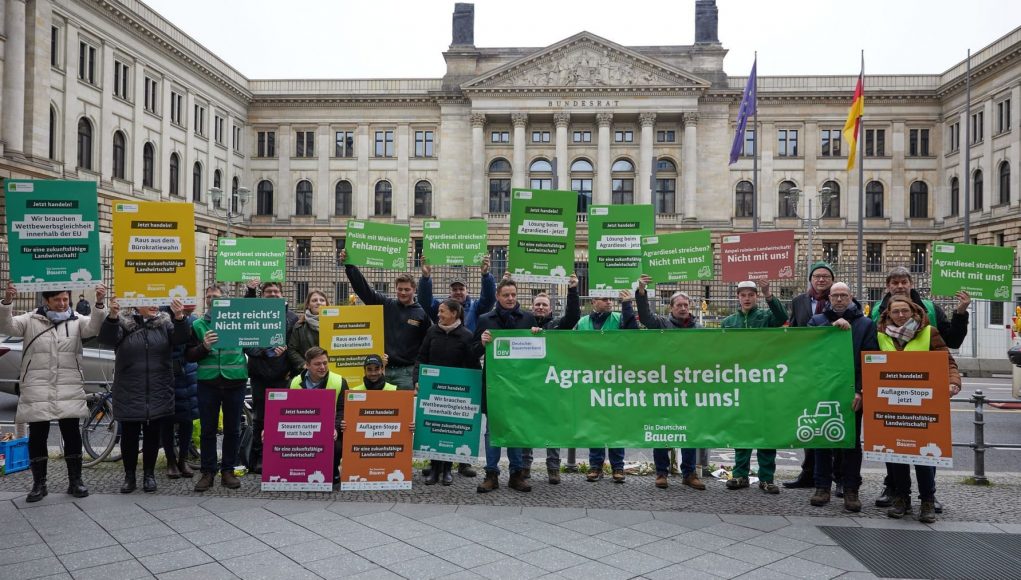The vote on the Growth Opportunities Act was also eagerly awaited by farmers in Germany. But although many are dissatisfied with the result, there was no major protest this time.
The Berlin police had warned on Thursday: In particular, the streets around the Federal Council, the government district and around the Straße des 17. Juni could be blocked this Friday due to an influx of tractors, trucks and cars. The traffic information center expected more than 1,000 vehicles.
The reality then looked different: According to the police, there were only 14 participants who stood in front of the Federal Council at 8:30 a.m. and demonstrated against the abolition of agricultural diesel subsidies. Freight forwarders and tradesmen also came to the main rally at the Brandenburg Gate to demonstrate for less bureaucracy and affordable energy prices. According to the police, the rally began at 12 p.m. with 160 participants; they had expected 2,000 participants. About 10 tractors, around 50 cars and a few trucks were parked on the adjacent Street of June 17th. The street was the only one closed during the rally.
It was an important day for the farmers. By approving the Growth Opportunities Act, the Federal Council also gave the green light on Friday to reduce subsidies for agricultural diesel. To ease the burden, the federal government announced a package of measures to support agriculture. However, there were no major protests this Friday, although discontent among farmers remains high. But it doesn't have to stay that way.
Farmers, craftsmen and freight forwarders are worried about their future
“That’s not enough,” says farmer Hans Henning Carstens. The 71-year-old has a farm in Mecklenburg-Western Pomerania and is worried about its future: “We need the diesel subsidies to survive.” That is the least that politicians owe the farmers. Another problem is products from abroad that can be sold cheaply in this country and represent competition. Without the subsidies, farmers would no longer be competitive. “Little by little, we farmers are being cut down more and more,” complained Carstens. The money should be saved elsewhere.
Most recently, the farmers showed up at the protests together with freight forwarders and middle-class craftsmen. Some of the participants in the demo at the Brandenburg Gate also come from the craft sector. The self-employed landscaper Matthias Sternberg, for example, came to campaign for greater political support for medium-sized businesses. He reports that his company has had to reduce its workforce significantly over the past two to three years.
The 36-year-old sees his existence threatened by rising prices. In addition, a reduction in bureaucracy is necessary so that processes are not unnecessarily slowed down and therefore more expensive. The resolution of the Growth Opportunities Act gives him little hope: “The problem is that things are decided before the basis exists.”
Maria F. is currently still training to become a warehouse clerk. She came to the demonstration because she sees her future at risk: “With the rising rents, I will soon no longer be able to afford an apartment on my salary,” says the 22-year-old. With current politics, she fears that the middle class will soon die out and points to a trailer on which a coffin is symbolically laid out. The word “Mittelstand” is written on it, with a grim reaper above it with a traffic light in his hands.
German Farmers' Association wants to continue fighting
The President of the German Farmers' Association, Joachim Rukwied, was also disappointed with the decision. Nevertheless, the association will continue to fight: “Agricultural diesel will play an important role in the political debate at least until the next federal election,” said Rukwied. “We will keep up the pressure,” and his association will ensure this through, among other things, protest actions.
The German Farmers' Association registered the demo with the Federal Council, but was expressly not involved in the demonstration at the Brandenburg Gate. According to the Berlin police, the organizer of the rally was the association “SMEs stick together – Saxony/South Brandenburg”.































